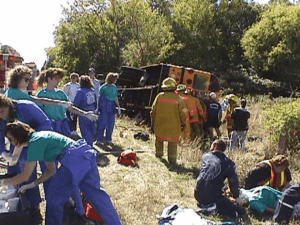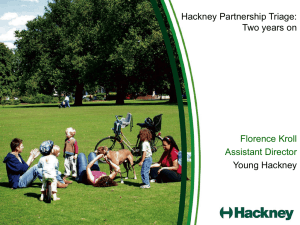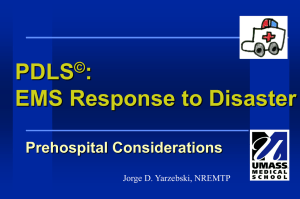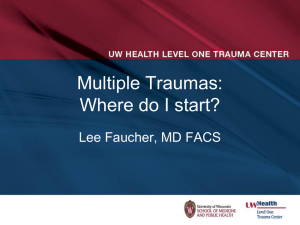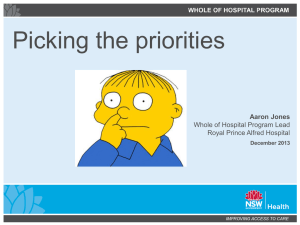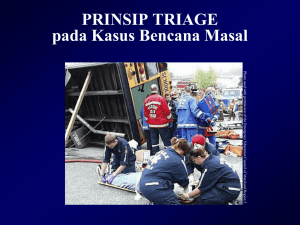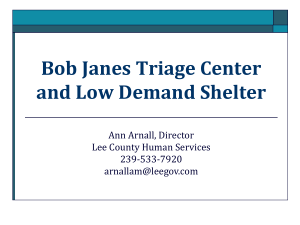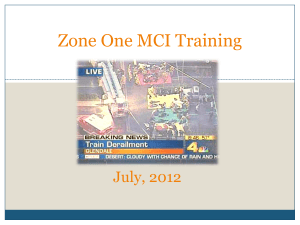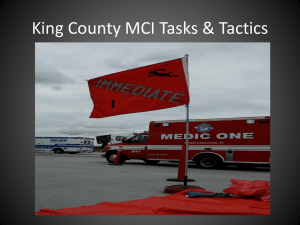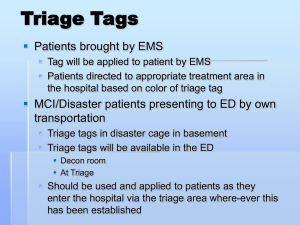EMS COMMAND - WMA Fire & Rescue
advertisement
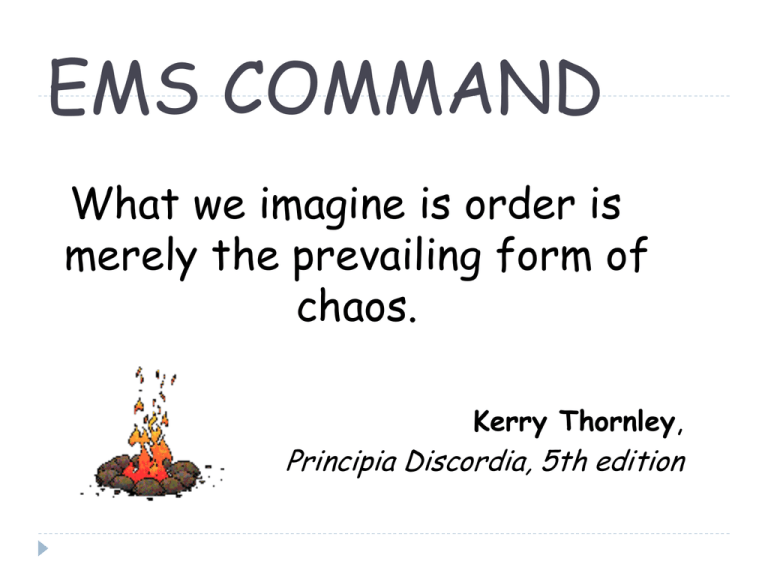
EMS COMMAND What we imagine is order is merely the prevailing form of chaos. Kerry Thornley, Principia Discordia, 5th edition PROCEDURE At all medical incidents where Command has been established, the Incident Commander will implement the necessary components of the EMS Command structure to ensure firefighter and public safety. Additionally, he/she will effectively mitigate the incident while maintaining strict accountability for all patients and their personal belongings. EMS COMMAND IMPLEMENTATION Implement EMS Command early. Develop the system in a logical order. Provide tactical objectives to subordinate positions when you assign them. Determine if your incident requires the expanded EMS ICS structure to manage it. Think about geography (Scene set-up). Use visual indicators to assist responders and the public. TERMINOLOGY Mass-Casualty Incident – Any incident with multiple patients that will significantly impact local resources including area hospitals. 1st Alarm Medical – Through our established Automatic Aid Agreement, a 1st Alarm Medical will result in the response of 2 Engines, 2 Rescues, and 1 Command Officer. (No such thing as a 2nd Alarm Medical) EM’s System – The Medical Communications Officer will activate the EM’s system through Summit Regional. This system will indicate the availability and status of all regional facilities. (Flagstaff, Phoenix, Tucson, etc….) ROLES AND RESPONSIBILITIES COMMAND Command : Establishes an effective command structure. Manages Communications. Utilize EMS Command tools to assist in this process. EMS Tactical Worksheet Command Checklist MEDICAL Medical : Reports to Command . Organizes incoming resources to mitigate large EMS incidents. Medical Branch Director Checklist TRIAGE Triage : Reports to Medical/Command. Recon incident area. Is responsible for sorting and casualties. Triage Unit Leader Checklist prioritizing all Triage Team, reports findings up the Chain of Command Incident Command Medical Branch Triage Team EXAMPLE: “Medical , Triage Team 1 triaged 15 patients, 7Immediate, 7-Delayed, and 1-Dead or Dying” TREATMENT Treatment : Reports to Medical/Command Responsible for prioritizing casualties and treating the injured. Treatment Unit Leader Checklist SUPERVISES TREATMENT AREA. • REPORTS TO MEDICAL / COMMAND • Immediate Treat Area • Minor Treat Area TREATMENT OFFICER TEAM SETS UP TREATMENT AREA • UTILIZE VISUAL CUES TO DESIGNATE THE AREAS Treatment Entry Point TREATMENT OFFICER / TEAMS •Treatment Teams are responsible for re-evaluating and stabilizing patients brought by each assigned “litter bearers.” TRANSPORTATION Transportation Organizes and coordinates the transportation of all casualties. Transportation Unit Leader Checklist Transportation Record TRANSPORTATION OFFICER • Remains around the designated treatment area and works with the Treatment Officer on transport priorities. • Assigns patients to transport units. • Removes last tag and puts it into the “Hospital Can” • Reports to Medical / Command. RESCUE Rescue/Extrication: Reports to Medical/Command Removes trapped victims and provides for their movement to triage/treatment area(s) (whichever is most appropriate.) Rescue Group Checklist MEDS COMM Medical Communications (MEDS COMM) Reports to Medical/Command Maintains communications with area hospitals (EMSCOM) and dispatch to facilitate transportation of victims to the appropriate facilities. MEDS COMM Checklist MEDICAL COMMUNICATIONS Medical Communications Officer maintains communication with area hospitals via EMSCOM. Receiving hospitals availability in terms of #’s of Immediate/Delayed/Minor pt’s they can take. Report to receiving facilities the pt. triage level, transport unit #, and ETA. If requested by Medical Branch, implement the EM’s system . MEDICAL STAGING Medical Staging : Reports to Transportation/Medical Establishes, organizes and maintains an area for incoming medical resources. Medical Staging Checklist MORGUE Morgue: Report to Medical/Command. Collect, protect, and identify deceased victims. Morgue Manager Checklist MORGUE MANAGER Mission-Collect, Protect, and Identify bodies Establish morgue area Utilize Law Enforcement/Coroner for assistance Use litter bearers for moving of dead Morgue MEDICAL SUPPLY Not included in the EMS Command Kits. Treatment Officer assigns team to rob equipment off of every truck. Or, have trucks bring all equipment to treatment area prior to being assigned to a task. As the MCI develops, other actions may need to be taken to facilitate equipment. (Department Stock). EXAMPLE The following is an example of a typical MCI and the associated command structure. IC The ICS Structure Triage Group MEDS COM Morgue Treatment Group Transportation Group Triage Teams Immediate Manager Medical Staging Litter bearers Delayed Manager Ground Ambulance Manager Minor Manager Air Ambulance Manager Medical Supply Rescue Group Extrication Teams IC The ICS Structure PIO Medical Branch Triage Group Safety Hazmat Branch MEDS COM Morgue Treatment Group Transportation Group Triage Teams Immediate Manager Medical Staging Litter bearers Delayed Manager Ground Ambulance Manager Minor Manager Air Ambulance Manager Medical Supply Fire Branch Divisions Rescue Group Extrication Teams Groups IC The ICS Structure PIO Operations Medical Branch Triage Group Morgue Treatment Group Transportation Group Triage Teams Immediate Manager Medical Staging Litter bearers Delayed Manager Ground Ambulance Manager Minor Manager Air Ambulance Manager Medical Supply Planning Hazmat Branch MEDS COM Safety Logistics Fire Branch Divisions Rescue Group Extrication Teams Groups Admin/Finance Immediate Treat Minor Treat Treatment Entry Point Triage Area Medical Staging
